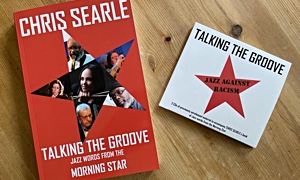Home » Jazz Articles » Book Review » Bunny Berigan: Elusive Legend of Jazz
Bunny Berigan: Elusive Legend of Jazz
 Robert Dupuis
Robert Dupuis Bunny Berigan: Elusive Legend of Jazz
Louisiana University Press
ISBN: 0-8071-3068-0
384 pages
After Bunny Berigan's death many writers said that eventually he would be held in the same high regard as Bix Beiderbecke. Obviously that didn't happen; Bix became the talented white trumpeter who died too early and Berigan is remembered, if he's remembered at all, for his solos on Goodman's "King Porter Stomp, Dorsey's "Marie, and maybe for "I Can't Get Started, his biggest hit as a leader. Musicians both then and now speak reverently about Berigan's proficiency; a frequent comment is, "You had to hear him play. So is Berigan destined to forever be a marginal figure, one admired by those in the know but neglected in most peoples' memories?
Dupuis' biography sheds a great deal of light on the background of Berigan, who was one of the first important soloists in jazz history. Armstrong, of course, was the one who developed the idea, but early jazz musicians like Berigan who were influenced by Armstrong's playing were the ones who refined it and fortified it with their own technique. Many spoke of Berigan at the time as someone who was had listened closely to his idols, absorbed what they had to offer, and built on that foundation to create his own style. He had a tremendous range, a strong presence in the lower register and a singing peal in the upper register. After recording his famous solo on "Marie, Tommy Dorsey transcribed it note for note for his trumpet section.
But Berigan's life was also fraught with the usual complications that ruined many a jazz man's career. Although he was married, he was a notorious womanizer and carried on a tumultuous affair with singer Lee Wiley (who all but comes across as the devil in this book). He led his own band, but lacked the business acumen to be successful at it and wound up severely in debt. But most of all, Dupuis points to Berigan's alcoholism as the beast that eventually wrecked his career and prevented him from becoming the widely recognized player that he could have been. It also led to his early death at 39. But it's a testament to his band's faith in him that even when he was too intoxicated to play a solo and too in debt to pay his musicians, many of them stuck by him to the end. However, while an untimely demise can give an artist a morbid immortality, it can also cause them to fade from the public's eye.
The most insightful parts of this biography are the chapters that discuss the context of Berigan's life. The chapter on life as a studio musician is especially colorful as we are given tales of the lucrative early days of radio where musicians hustled from studio to studio to make dates and jammed in clubs after they were done for the day. We also get a useful comparison of the lives of Beiderbecke and Berigan, who lived quite similar lives, and one could conclude that Bix only became the legend over Berigan because he came first. Most insightful is a chapter about alcoholism that is loaded with contemporary research that illustrates why the disease was so deadly to Berigan and, by extension, all who suffer from it.
Berigan's life is a classic tragedy of a man who wandered through the lives of some of the most famous people in jazz. Most people haven't heard all that much of Berigan's music, and those who pick up this book will no doubt by intrigued enough to seek out some of his recordings. Dupuis is a Berigan fan who felt the need to present his hero to a larger public and should be commended for not only correctly asserting his importance but also giving an unvarnished look at the trumpeter's life. Sometimes while the music may be lovely, the creation of it isn't always a pretty picture.
< Previous
A Study in Blue
Next >
Sonny Sharrock: Ask the Ages
Comments
Tags
For the Love of Jazz
 All About Jazz has been a pillar of jazz since 1995, championing it as an art form and, more importantly, supporting the musicians who create it. Our enduring commitment has made "AAJ" one of the most culturally important websites of its kind, read by hundreds of thousands of fans, musicians and industry figures every month.
All About Jazz has been a pillar of jazz since 1995, championing it as an art form and, more importantly, supporting the musicians who create it. Our enduring commitment has made "AAJ" one of the most culturally important websites of its kind, read by hundreds of thousands of fans, musicians and industry figures every month.























